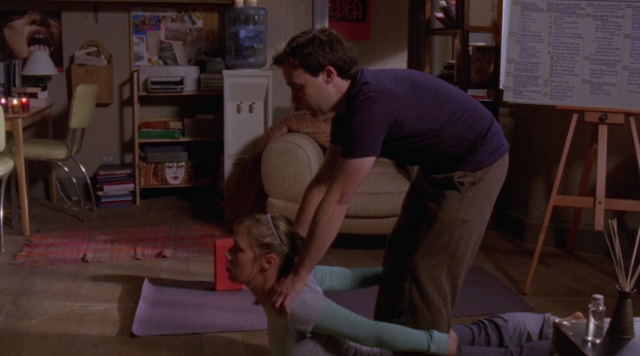How Gilmore Girls Do Money: Paris Geller and Doyle McCaster

Paris and Doyle decided to get married after their 2010 Relationship Performance Review, when they compared notes and found that they had both moved “marriage” from their five-year plan to their two-year plan.
It was the type of proposal that made Paris happy in a way she knew nobody but Rory and Doyle would understand — and that was good because she didn’t have anyone else to tell besides Rory and Doyle (who was there, and both was and saw the primary source of her happiness) and the cursory email to her parents. She hit Send, told Rory over Skype, and went to bed smiling.
When she woke up the next morning, there was a ring next to her pillow. It was from Doyle, but he and Paris both knew it was also for him, in that he had dreamed and planned for this and wanted the reward of seeing Paris slip on her engagement ring. They had both read The Five Love Languages. Love was about giving each other these moments, the touch and eye contact and conversation that were even more important than the ring.
The ring was fairly important, as rings go; it was a McCaster family heirloom, which was important to Doyle because it meant he was able to both carry on and please his family simultaneously. It was important to Paris first because the ring was extraordinarly well crafted — “you should see some of the shoddy workmanship jewelers try to palm off these days” — and second because it meant they did not have to calculate “engagement ring” into their monthly budget, and rework the spreadsheets that told them where every dollar would go after it was earned.
The truth was that Doyle’s family probably could have helped more, but both Paris and Doyle preferred to do it their own way. That meant apartments that continued to resemble their student share, sweaters and sack lunches, and spreadsheets. “We’re doing very well,” Paris liked to say, after she looked at the numbers slowly filling up their savings account and investments. “Better than most people our age” — which was, of course, what was important.
Paris never wondered whether she would do better than her parents, because she had seen how they ended up. That was part of why she insisted they hire a CPA, instead of letting Doyle poke around at TurboTax. “I will not go down for tax evasion,” she said, making a joke of her anxiety, and Doyle set up the meeting with the CPA because he loved her.
Doyle did wonder whether he would do better than his parents, but he also kept reminding himself that he was playing a different game. Staff writers weren’t known for their wealth. A generation ago they might have been known for their middle-class lifestyles, but now they were known for the number of Twitter followers and likes they received, and Doyle was surprisingly good at maintaining his online brand. It was easier for him to connect with people through an online interface; he could write whatever he wanted without his body language betraying his impatience or his own anxiety, and much of what made him intimidating or offputting in person disappeared.
Paris had a bit of a harder time, because she had to — as she put it — “be less intimidating backwards, and in high heels!” She also had a huge gap in her five-year plan, once she realized that going to medical school might give you the ability to name all 206 bones in the body (which, let’s be honest, she could do since she was five) but it did not give you the ability to stop your panic attacks when faced with an actual person in need of care, and Paris got panic attacks looking at the cadaver. She refused to say she fainted at the sight of blood because that sounded like a cliche. Doyle joked that her blood pressure went down along with her patient’s.
The obvious solution presented itself, and in 2009 Paris began working as a private tutor for Chilton students while trying to figure out what she’d need to do to get Headmaster Charleston to hire her. The trouble was that it didn’t feel right, not like the way being with Doyle felt right, and not like Doyle’s growing career as a writer felt right. They were doing everything right, in fact — they were living in Hartford to save money, Doyle was taking trips into New York to get to know the industry, they were saving, they were investing, they were doing better than their peers — and it still felt wrong.
“After the wedding, I think I might like to go to law school,” Paris texted Doyle over her lunch break. She made it real 10 minutes later when she sent Doyle a Google calendar request for a planning and strategy meeting.
He accepted in two seconds and texted her an emoji heart. She texted back clapping hands. Then they both got back to work.
Previously on “How Gilmore Girls Do Money:” Lindsay Lister
Support The Billfold
The Billfold continues to exist thanks to support from our readers. Help us continue to do our work by making a monthly pledge on Patreon or a one-time-only contribution through PayPal.
Comments